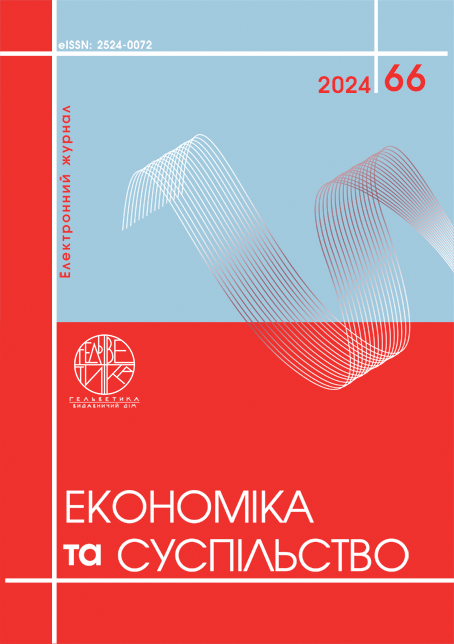INTEGRATION OF INNOVATIVE PEDAGOGICAL TECHNOLOGIES INTO THE TRAINING OF TOURISM BUSINESS SPECIALISTS: MODERN APPROACHES AND PRACTICAL ASPECTS
Abstract
The article explores modern approaches to training tourism business specialists through the integration of innovative pedagogical technologies into the educational process. The article considers the need to adapt educational programmes to a rapidly changing labour market, which requires highly qualified specialists who are able to work effectively in the context of globalisation and digitalisation. The main focus is on the analysis of such innovative teaching methods as contextual, simulation and problem-based learning, modular complete knowledge acquisition, distance learning and design thinking. These methods are aimed at ensuring deep knowledge acquisition, development of professional competences and creative skills of students. Contextual learning focuses on creating a learning environment that simulates real professional settings, allowing students to gain practical experience while they are still studying. Simulation-based learning, based on the use of role-playing games and simulations, promotes the development of practical skills and decision-making abilities in conditions as close to real-life as possible. Problem-based learning stimulates the development of critical thinking and analytical skills, which are key to solving complex problems in the tourism industry. The modular complete assimilation of knowledge allows the educational process to be structured in such a way that students can learn the material in stages, which improves the quality of education and individualises the approach to learning. Distance learning is seen as an effective tool to ensure continuous access to educational resources and professional development, especially in the context of the pandemic and the development of digital technologies. Design thinking, in turn, contributes to the development of an innovative approach to creating customer-focused tourism products. The article emphasises the importance of integrating these methods into the training of tourism business specialists, which allows improving the quality of training and ensuring that graduates are ready to work effectively in the modern tourism market. It is concluded that the use of innovative pedagogical technologies is a key factor in the formation of competitive professionals who are able to adapt to the challenges of time and implement the latest solutions in their activities. This article will be useful for teachers, educational managers, researchers and anyone interested in current trends in training for the tourism business.
References
Сингаївська І. В. Використання інтерактивних методів навчання при підготовці майбутніх фахівців туристичної сфери. Регіональний туризм: сучасний стан та шляхи оптимізації : матеріали I Міжнар. наук.-практ. конф., м. Київ, 2 квіт. 2021 р. Київ : КРОК, 2021. С. 160–162. URL: https://tourlib.net/statti_ukr/syngaivska.htm.
Sushchenko O., Akhmedova O., Stryzhak O. The use of interactive training technologies in teaching academic disciplines for students of tourism specialities. Access to science, business, innovation in digital economy. 2021. Vol. 2(1). P. 28-39. DOI: https://doi.org/10.46656/ access.2021.2.1(3).
Остап’юк Я. І., Миронов Ю. Б. Проблеми підготовки туристичних кадрів на сучасному етапі розвитку ринку туристичних послуг в Україні. Реформа освіти в Україні. Інформаційно-аналітичне забезпечення : матеріали Міжнар. наук.-практ. конф., м. Київ, 28 жовт. 2021 р. Київ : ДНУ «Інститут освітньої аналітики», 2021. 360 с. URL: https://iea.gov.ua/wp-content/uploads/2021/12/Tezi_III-konf_2021-FINAL.pdf#page=304.
Мізюк Б. М. Інтерактивні технології підготовки фахівців у сфері туризму. Актуальні проблеми економіки і торгівлі в сучасних умовах євроінтеграції : матеріали наук. конф., м. Львів, 10–11 трав. 2018 р. Львів : ЛТЕУ, 2018. 386 с. URL: https://tourlib.net/ statti_ukr/mizjuk4.htm.
Матросова В. О., Перерва П. Г., Матросов О. Д. Кадрове забезпечення галузі туризму та гостинності. Видавництво Львівської політехніки, 2019. С. 515–516.
Підготовка кадрів для активного туризму (н.д.). URL: http://referatss.com.ua/work/pidgotovka-kadriv-dljaaktivnogo-turizmu-organizacija-shkil-seminariv-kursiv/
Synhaivska, I. V. (2021). The Use of Interactive Teaching Methods in the Training of Future Tourism Professionals. Regional Tourism: Current State and Ways of Optimization: Proceedings of the 1st International Scientific and Practical Conference, 160-162. Kyiv: KROK. Retrieved from https://tourlib.net/statti_ukr/syngaivska.htm [in Ukrainian].
Sushchenko, O., Akhmedova, O. & Stryzhak, O. (2021). The use of interactive training technologies in teaching academic disciplines for students of tourism specialities. Access to science, business, innovation in digital economy, 2(1), 28-39. DOI: https://doi.org/10.46656/ access.2021.2.1(3).
Ostapyuk, Ya. I. & Myronov, Yu. B. (2021). Problems of training tourist personnel at the current stage of development of the tourist services market in Ukraine. Educational reform in Ukraine. Informational and analytical support. Proceedings of the International Scientific and Practical Conference. Kyiv. Retrieved from https://iea.gov.ua/wp-content/ uploads/2021/12/Tezi_III-konf_2021-FINAL.pdf#page=304 [in Ukrainian].
Mizyuk, B. M. (2018). Interactive technologies for training specialists in the field of tourism. Actual problems of economy and trade in modern conditions of European integration. Proceedings of the Scientific Conference. Lviv. Retrieved from https://tourlib.net/statti_ukr/ mizjuk4.htm [in Ukrainian].
Matrosova V.O., Break P.G. & Matrosov O.D. (2019) Kadrove zabezpechennya haluzi turyzmu ta hostynnosti [Staffing of tourism and hospitality]. Lviv Polytechnic Publishing House, рр. 515–516.
Pidhotovka kadriv dlya aktyvnoho turyzmu [Training for active tourism] (n.d.). Available at: http://referatss.com.ua/ work/pidgotovka-kadriv-dlja-aktivnogo-turizmu-organizacija-shkil-seminariv-kursiv/[in Ukrainian].


